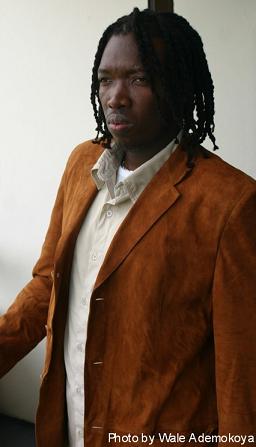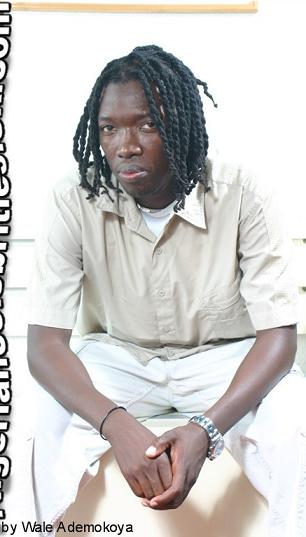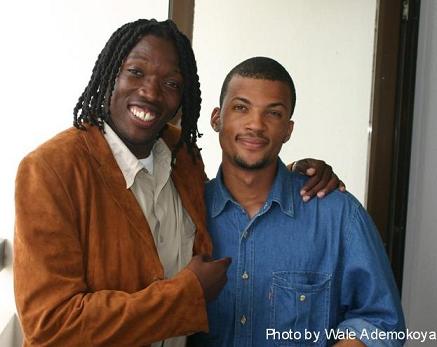Could Kabelo Ngakane have achieved
more than taking tapes from one side of Mnet office to
the other? The odds and the elements were totally against
this diligent Channel O South African presenter, yet he
carried it off with perfection and grace. In this exclusive
interview with NE, the conscientious international TV
presenter bares it all.

NE: You seem to be tangled in so many
things, can you tell us the projects you are working on
currently?
KABELO: I’ve just opened my own entertainment company
called Krazy boy (KB). The idea obviously is first and
foremost TV production, eventually we’ve already done
some projects recently in Ethiopia for the Bob Marley’s
birthday celebration…I was there with my production company
shooting for Channel O, we are also in the process of
coming up with another project for Channel O called ‘Urban
Massive’, that will have me traveling round the continent
and give me the opportunity to find out the urban lifestyle
of young Africans wherever we go in the major cities around
Africa, and of course Lagos Nigeria will definitely be
one of them. So by the time I get back home today, we
should be ready to get into production, that’s the one
thing I am busy with. For now, I am still struggling to
get off the ground as far as the music thing is concerned,
I mean I did that project as well for Big Brother Africa
and that went quite well because we actually got a South
African music Award nomination for that song. I am still
presenting, so this initial ‘Urban Massive’ I’ll be producing
and presenting it. Right now I am doing a reality soccer
show back home, that is gotten me well on the national
platform (South Africa) and I am still on breakfast radio
back home on Metro FM, so yeah…I am still doing a bit
of that. So now, because I am doing production I am saving
my last month in the offices at Channel O, I am going
to concentrate on presenting and producing.
NE: How do you hope to achieve all these,
I mean…aren’t you going to get distracted doing many things
at the same time, don’t you think it’s better to do things
accordingly?
KABELO: I think I have been blessed and I just push hard,
it’s the hunger that I’ve seen. My traveling around Africa
has made me realize how fortunate I am to be what I am
and have showed me that people with even less that I have,
fight and strive and actually get more than I get, so
why shouldn’t I? I think the experience is also going
to be good for me in the sense that all these things I
am coming up with have experiences of their own, which
means I will be learning something in each thing that
I do. The school of life is endless and it teaches you
more than books can teach you, its important that you
get your education from books but the school of life is
also very wide.
NE: Still talking about all these things
you do. Don’t you get exhausted at times that you feel
like giving up?
KABELO: Yeah, it does get like that. I wake up half
past five in the morning, get the breakfast ready, after
the breakfast is ready I go to the office at Mnet and
stay there for about five to six in the evening…trying
to come up with some ideas, prepare for the next day etc
I have to be sleeping by nine so it’s really hectic and
then on weekends…that will be the only time I try to rest
but something is always going on. I do MC jobs too. I
also do voice over, it’s really crazy you know?
NE: So, which would you say you are more
perfect at?
KABELO: Oh the presenting, yeah…that I do flawlessly now.
I mean after seven years of doing it now it becomes a
second nature, that’s the easiest thing that I find doing
and everything else is about learning. I also am going
to move to music, video production, maybe eventually making
movies, that sounds like a ten-year plan but I don’t know
where life is taking me.
NE: What keeps you going?
KABELO: Well…life, I am grateful to still be alive so
while I am still alive I think I should use every opportunity
to do whatever I can, looking at the blessing yet again,
looking at the plight of the young Africans. We have so
much opportunity and it would be a wasted opportunity
when you’ve got the chance to do, if you’ve got the skills
to do it.
NE: Nigeria’s been rated the second
most corrupt country in the world. What is your opinion
so far about Nigeria?
KABELO: People are drive in Nigeria, I was speaking
to somebody earlier on, a lady from South Africa, she
was saying huh…you know what? One thing you cannot take
away from Nigerians is their drive, no matter what job
it is. Whereas in some countries you’ll find that people
do get lazy while they’ve got so many opportunities but
here…everybody is doing something and that drives me as
well and it also makes me realize that I can actually
be more than I am…looking at what people are doing everywhere
around the continent, so I definitely love the drive…your
women! Jesus. And of course the friendliness of the people,
it’s refreshing to always come back here and see the love
the people have, the friendliness and the energy that
they have…yeah, that’s definitely nice.
NE: But when Nigeria is mentioned anywhere,
people are always like scared you know…Nigeria’s being
typecast as a whole.
KABELO: I think that stereotypy has been sent around
the world. We live with a whole lot of Nigerians back
home in South Africa. I feel people just come with that
preconception, I know better because I have traveled and
I have been here (Nigeria). Every country has a corrupt
side, I mean right now in the news paper ‘Business Day’,
there is an article about corruption in my country “South
African President fires his deputy” why? Because of fraud,
it doesn’t mean that the whole country is like that. Every
where…New York, South Africa, Nairobi, Lagos, Abuja you
know, I mean there’s going to be the good and the bad,
that’s the reality of the world, that’s the balance of
the world. I think most people who exist within the realms
of the good would like the bad not to exist. So it’s the
balance of the world, you’re going to get the bad; you’re
going to get the good…so I have been fortunate enough
to experience the good of Nigeria. I have never experienced
a corrupt Nigerian, so I’ve been fortunate but the stories
still come…I mean, there is a warning on my hotel table
there that “hey, look out for the 419 men” and I think
that shows that all Nigerians are not bad, why? Because
they’re warning you.

NE: Some Nigerians even complain about
the way they are being treated in South Africa and even
the South African Embassy here in Nigeria…
KABELO: Yeah, all over the world. I mean you just
think about anything bad in London then Nigerians and
Jamaicans will come up. So it’s a reputation, if Nigerians
are so bad why are people trying to come and visit here
anyway? So people do realize that it’s not all bad. But
people interacting with Nigerians will find out that it
is more about the drive of Nigerians that you’ve got to
look at and not what a few people have done. I think some
stories have a reputation to be inflated for the sake
of a beautiful story. I remember talking to a lady yesterday
at the club and she said she was worried about coming
to Johannesburg because she heard that so many people
get killed there, and I was like yeah… if you come to
a bad part of Johannesburg just like if you go to a bad
part of New York. So there are some bad parts in the world
and unfortunately we cant help that. But we need to educate
people and say hey look “My country is still beautiful,
your country is still beautiful, they say things that
are right and wrong about them and it is what you decide
to do with that balance that matters most”.
NE: You come across as someone who adapts
to any situation in life, not that you have a choice though…does
this have anything to do with your childhood? How was
growing up like?
KABELO: My first memories were with my maternal grandmother.
My father got married twice and both marriages failed…
NE: Really?
KABELO: Oh yeah…my father came to pick me from my
grandmother when I was about 8 years old, I lived with
him and that gave me the chance to attend multiracial
schools which helped me interact with people from different
backgrounds…Chinese, Taiwanese, English, American etc.
I remember that I couldn’t speak English then. My first
plane trip actually was huh…I was much younger and my
father took me on the plane. I was sitting down in the
plane as a little black boy and the white lady (the waitress)
comes through and talked to my father, I don’t know what
they say because I didn’t understand English and he gets
food and I’m like, hey. The only word I knew in English
was ‘Yes’. So she comes to me and ask me “would you like
this or that?” and I’ll just say “Yes” and she’s like
“No no, would you like this or that (pointing to the two
different food on the tray)” and all I’ll keep saying
is “yes”, so I ended up hungry on this flight because
she gave me coke and some snacks and my father was eating
a meal (laughs) and he’s not saying anything so I was
like I must learn this language as fast as possible. So,
my first experience of trying to learn English was at
one of these multiracial schools that my father sent me
to and I learnt English from these American young boys
and from then I just got love for trying to find out other
people’s cultures and where they come from etc. My father
got divorced twice as I said, the second time was quite
traumatic and actually damaging because it just broke
the family and I was left there to fend for myself. I
had two sisters and my mother (step mum) couldn’t do anything
but take care of those kids and my father was on his own,
so he was like “so…you’ve got to be a man, fend for yourself”.
At that time I was studying mechanical engineering, I
just finished school, I ran out of money. The next year
I got some money and was able to study computer soft wear
support that got me into Channel O, the following year
I tried as a presenter and the rest is history.
NE: I can imagine what you went through
then. So, what is your present relationship with your
dad now?
KABELO: It’s quite ok, though its not the greatest
relationship but I respect him a lot. I think that is
one thing I have been thought in the family, because we
come from a big family and we’ve been thought that you
should respect, irrespective of your differences and even
though that’s been hard, its been something that I’ve
had to do and I think that makes you a better person to
say just because you did wrong to someone doesn’t mean
that you need to go and do something else wrong so definitely,
I still have respect for him…I mean, he brought me up
and that can be appreciated.
NE: Why are you still single…one would
have expected someone in your line of work having girls
flaunting around every corner to get you?
KABELO: I knew you were going to come to this Dimeji (Laughs).
Well, I think I am very choosy and at this moment in time
as well, I am doing a lot of things. I tried a relationship
about two months ago and it didn’t work out because of
the work I do. I don’t believe its fair to have a relationship
and you don’t see the person for a week, that’s ridiculous,
so I think the right person will come whenever it will
happen.
NE: Maybe a Nigerian girl…
KABELO: (Laughs) I am thinking yeah. Oh no, I’ve seen
the women here; they work with such grace…goodness!
NE: So what’s your opinion about the
music industry and the entertainment industry as a whole
in Nigeria?
KABELO: I think it’s growing very well, it help the youngsters
as well. The music in Nigeria is really gone far. You’ve
had guys that have had world acclaim like Fela, Femi Kuti,
Lagbaja, King Sunny Ade and then the youngsters…Tony Tetuila,
2 face etc it shows that the legacy of Nigerian music
is in good hands, it grows for as long as you’ve got good
structures. It’s a good mixture of people because if its
just one view from one person, it doesn’t make it interesting
enough.
NE: How difficult is it to get into the
entertainment industry in South Africa?
KABELO: It’s quite difficult because it’s still a
new industry. I think that the industry as a whole in
the continent is quite new to the success that we wanted
from it. There are many kind of music that is selling
quite well but not all young people can do that. And then,
there is the culture of hip-hop that is really growing.
R&B…yes still coming but there is not enough artist
pushing it and perfecting it to make it big enough but
you have to start from somewhere.
NE: You’ve been in the entertainment
industry since 1998, would you say you are fulfilled?
KABELO: No I am not yet fulfilled. I still have a
lot to give and to learn from in the industry, that’s
why I evolve. I started out as just a guy who was taking
tapes from one side of Mnet to the other and now I’ve
become the most popular face on Channel O, I am a presenter
right now, I do MC work now and I also do productions.
So there is a lot that I can still offer the industry.

NE: Can you tell me one major thing you
still look forward to?
KABELO: I’d like to grow my entertainment company to a
company that can get a few people from around the continent
to work together. I’ve had the fortune of having fans
based all around the continent whereas not everybody can
have that, I have people that know me in Nigeria but it
doesn’t necessarily mean that everybody knows people from
Nigeria in South Africa and else where, and if you’ve
got that it means you have an opportunity to make ties
with people, bring business vice versa, they bring business
into South Africa through me, I’ll bring business into
Nigeria through my context. I know there is greater opportunity
for things to happen with what I have.
NE: Looking at your success from being
an ordinary guy at Mnet and then one of the most sought
after faces on TV, what goes through your mind?
KABELO: I think most of us never take time to look at
what we’ve achieved, we look at the problems that exist
right now. If you look back and ask yourself “over the
last five years what have I achieved?” that would blow
you away and that would keep you trying to strive for
more and it will make you look at the situation right
now and say “Look, I can still try and get this even though
there is a few stumbling blocks…I still push forward”.
So it’s encouraging for me to say, “Ok, I’ve gotten this
far from where I started”.
NE: So do you plan to do anything outside
entertainment in the future?
KABELO: If there is an opportunity to do something else
that somebody else can’t do and I happen to be able to
do it, so be it.
NE: Doing all those things you said you
do, one wonders if you ever have time to relax.
KABELO: I just stay at home and play my Playstation2,
I enjoy playing soccer on it, and I can play for the whole
day.
NE: What’s the downside of being a popular
face not only in your country but everywhere you go…it
must be very tiring at times, how do you cope?
KABELO: I think I am coping quite well, fortunately
I am a friendly person so it goes with my nature to be
the way I am, it’s not a struggle for me to say hello
to anyone, to speak to anybody and make friends. I think
the scary thing is that you don’t have privacy, but that’s
the price to pay for it, but it does get scary to say
ok “I don’t have a moment where I wont be judged”. If
I don’t say hello to you because I am feeling sad or my
father passed away…you don’t know that, but I can be judge
and that can mess up a reputation, so that’s why it’s
scary sometimes, you live, learn and you go with it.
NE: Thank you very much for this interview.
KABELO: You’re welcome Dimeji, thank you very much for
this interview. Hope to see you again soon.







